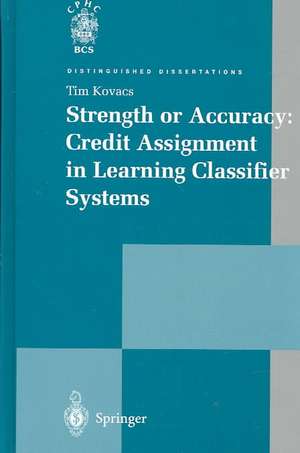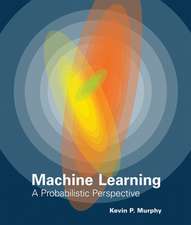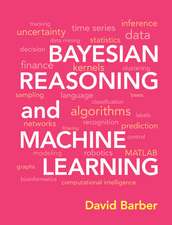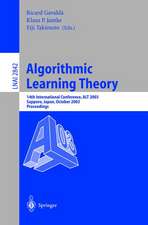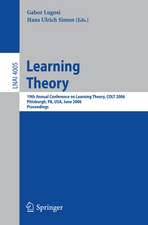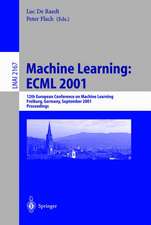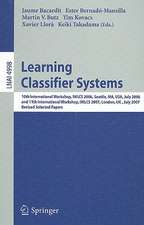Strength or Accuracy: Credit Assignment in Learning Classifier Systems: Distinguished Dissertations
Autor Tim Kovacsen Limba Engleză Hardback – 20 ian 2004
| Toate formatele și edițiile | Preț | Express |
|---|---|---|
| Paperback (1) | 988.48 lei 6-8 săpt. | |
| SPRINGER LONDON – 4 oct 2012 | 988.48 lei 6-8 săpt. | |
| Hardback (1) | 994.92 lei 6-8 săpt. | |
| SPRINGER LONDON – 20 ian 2004 | 994.92 lei 6-8 săpt. |
Din seria Distinguished Dissertations
- 20%
 Preț: 290.51 lei
Preț: 290.51 lei - 15%
 Preț: 633.68 lei
Preț: 633.68 lei - 15%
 Preț: 645.47 lei
Preț: 645.47 lei - 20%
 Preț: 654.05 lei
Preț: 654.05 lei - 20%
 Preț: 647.79 lei
Preț: 647.79 lei - 20%
 Preț: 648.26 lei
Preț: 648.26 lei - 20%
 Preț: 328.60 lei
Preț: 328.60 lei - 20%
 Preț: 641.34 lei
Preț: 641.34 lei - 20%
 Preț: 328.09 lei
Preț: 328.09 lei - 20%
 Preț: 325.30 lei
Preț: 325.30 lei - 20%
 Preț: 926.94 lei
Preț: 926.94 lei - 20%
 Preț: 639.52 lei
Preț: 639.52 lei - 20%
 Preț: 640.69 lei
Preț: 640.69 lei - 20%
 Preț: 603.37 lei
Preț: 603.37 lei - 20%
 Preț: 637.56 lei
Preț: 637.56 lei - 20%
 Preț: 643.30 lei
Preț: 643.30 lei - 20%
 Preț: 640.51 lei
Preț: 640.51 lei - 20%
 Preț: 640.19 lei
Preț: 640.19 lei - 20%
 Preț: 325.63 lei
Preț: 325.63 lei
Preț: 994.92 lei
Preț vechi: 1243.64 lei
-20% Nou
Puncte Express: 1492
Preț estimativ în valută:
190.38€ • 203.58$ • 158.73£
190.38€ • 203.58$ • 158.73£
Carte tipărită la comandă
Livrare economică 18 aprilie-02 mai
Preluare comenzi: 021 569.72.76
Specificații
ISBN-13: 9781852337704
ISBN-10: 1852337702
Pagini: 328
Ilustrații: XVI, 307 p.
Dimensiuni: 155 x 235 x 23 mm
Greutate: 0.64 kg
Ediția:2004
Editura: SPRINGER LONDON
Colecția Springer
Seria Distinguished Dissertations
Locul publicării:London, United Kingdom
ISBN-10: 1852337702
Pagini: 328
Ilustrații: XVI, 307 p.
Dimensiuni: 155 x 235 x 23 mm
Greutate: 0.64 kg
Ediția:2004
Editura: SPRINGER LONDON
Colecția Springer
Seria Distinguished Dissertations
Locul publicării:London, United Kingdom
Public țintă
ResearchCuprins
Introduction.- Learning Classifier Systems.- How Strength and Accuracy Differ.- What Should a Classifier System Learn?- Prospects for Adaption.- Classifier Systems and Q-Learning.- Conclusion.- Appendices.- Evaluation of Macroclassifiers.- Example XCS Cycle.- Learning from Reinforcement.- Generalisation Problems.- Value Estimation Algorithms.- Generalised Policy Iteration Algorithms.- Evolutionary Algorithms.- The Origins of Sarsa.- Notation.- References.
Recenzii
From the reviews:
"This book is a monograph on learning classifier systems … . The main objective of the book is to compare strength-based classifier systems with accuracy-based systems. … The book is equipped with nine appendices. … The biggest advantage of the book is its readability. The book is well written and is illustrated with many convincing examples." (Jerzy W. Grzymal-Busse, Mathematical Reviews, Issue 2005 k)
"This book is a monograph on learning classifier systems … . The main objective of the book is to compare strength-based classifier systems with accuracy-based systems. … The book is equipped with nine appendices. … The biggest advantage of the book is its readability. The book is well written and is illustrated with many convincing examples." (Jerzy W. Grzymal-Busse, Mathematical Reviews, Issue 2005 k)
Caracteristici
There are few texts that deal with learning classifier systems at all; most include only a chapter or two on them, and are out of date The study of learning classifier systems has made great progress in the last few years, and is an increasingly active area of research The text is self-contained, and re-examines the subject from first principles Contains introductions to the relevant background material Includes supplementary material: sn.pub/extras
